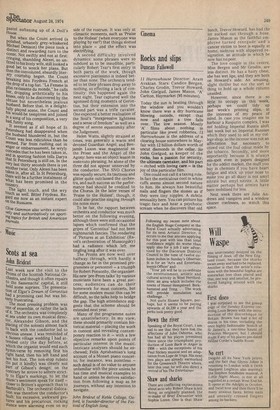Music
Scots at sea
John Bridcut Last week saw the visit to the Proms of the Scottish National Orchestra, and though it often repairs to the Sassenachs' capital, it still held some suprises. The presentation of Elgar's Dream of Gerontius had a promising cast but was bitterly frustrating. The most pressing problem was one of ensemble, or rather the lack of it. The orchestra was completely at sea under its own musical director, Alexander Gibson, and the Placing of the soloists almost back to back with the conductor led to Obvious unease. I was reminded of a Sussex village wedding I had attended only the day before, at Which the organist would end each 1lYmn-verse by removing first his right hand, then his left hand and last his foot. The non-stop rubato (to put it kindly) was clearly not Part of Gibson's design; on the contrary he strove to adhere strict'3' to Elgar's markings, to let the music's sentiment speak for itself — Closer to Britten's approach than to 13.arbirolli's. The orchestral dislocation was therefore the conductor's fault: his excessive, awkward gestures and his precarious, rocking stance were alarming even on my
side of the rostrum. It was only at climactic moments, such as 'Praise to the Holiest' (when everyone was playing by ear?) that things slotted into place — and the effect was electrifying.
A second difficulty involved dynamics: some phrases were so subdued as to be inaudible, particularly Robert Tear's first entry in both parts of the work, though excessive pianissimo is indeed better than none. The orchestra tended to let their phrases drop away to nothing, so effecting a lack of continuity: this happened again the next night. Tear captured well the agonised dying moments of Gerontius, but their extension into the second part was a trifle cavalier. One expected a better realisation of the Soul's "inexpressive lightness and a sense of freedom" as well as a degree of serene equanimity after the -Judgement. Helen Watts, slightly strained at times, was generally a warm and devoted Guardian Angel, and Benjamin Luxon was magisterial as the Priest and the Angel of the Agony: here was an object lesson in sostenuto phrasing; he alone of the three did not appear unnerved by the conductor. The SNO Chorus was equally secure; its tautness and glitter quite outclassed the orchestra, and such success as the performance had should be credited to the Chorus. In the later verses of 'Praise to the Holiest', though, it could also practise singing through the notes more.
To be fair, the rapport between orchestra and conductor was much better on the following evening, although there were still occasional lapses which confirmed that the gripes of `Gerontius' had not been nightmarish fancies. The rendering of 'Pictures at an Exhibition' (Ravel's orchestration of Mussorgsky) had a radiance which left me tingling long after it was over. The Proms are now well over halfway through, with hardly a change so far in the promised programmes or personnel —a triumph for Robert Ponsonby, the organiser. ills new 'pre-Prom talks' by various musicians have been a great success; audiences can do their homework for most concerts, but for some modern music this can be difficult, so the talks help to bridge the gap. The high attendance suggests that the scheme should be extended next year.
Many of the programme notes are unsatisfactory. In my view, these should primarily contain historical material — placing the work in context and revealing contemporary reaction to it — with a few objective remarks upon points of particular interest in the music. Intricate analyses should be eschewed; Felix Aprahamian's long account of a Mozart piano concerto, for instance, was pointless — such detail is of no value to anyone unfamiliar with the piece unless he has time and musical examples to hand or unless he derives satisfaction from following a map as he journeys, without any intention to navigate.
John Bridcut of Keble College, Oxford, is founder-director of the Festival of English Song.


































 Previous page
Previous page